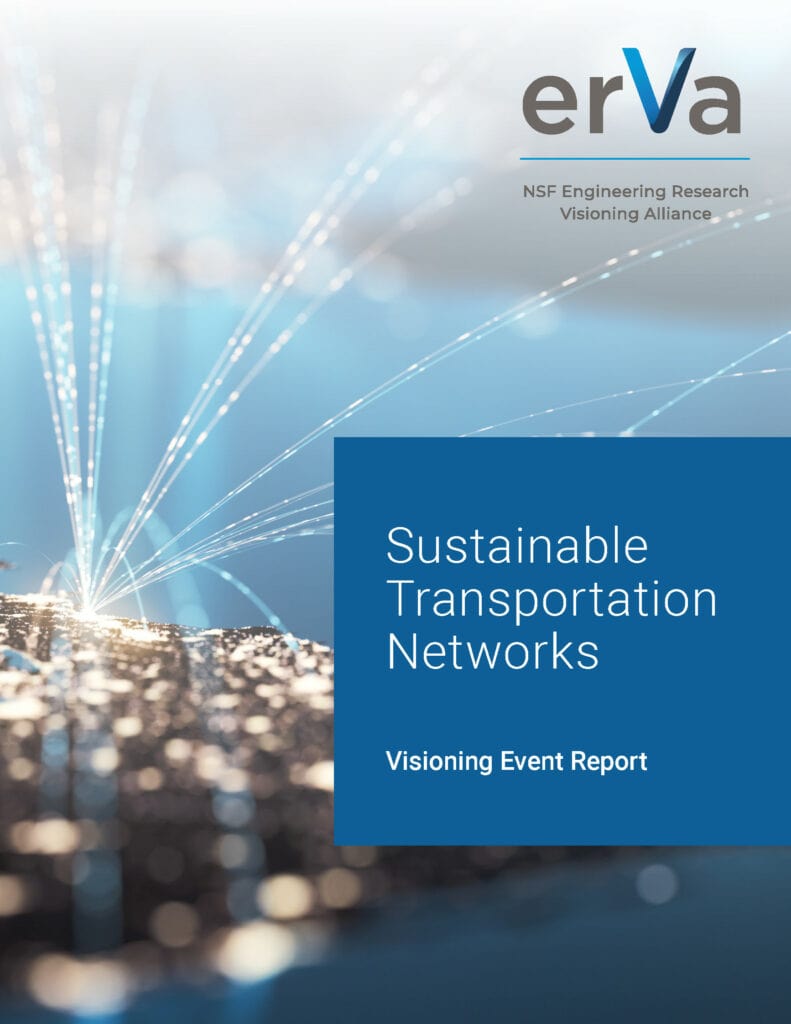Engineering Research Visioning Alliance’s (ERVA’s) latest report outlines how engineering research can help shape the future of sustainable transportation
April 27, 2023 –Whether moving people or freight, transportation is the largest user of energy in developed countries and the most rapidly growing energy consumer in developing nations. Achieving a future where transportation works efficiently and sustainably is the focus of a new report from the Engineering Research Visioning Alliance (ERVA), an initiative funded by the U.S. National Science Foundation. It articulates bold engineering research priorities to advance a future with fully sustainable transportation networks. It also aims to inspire researchers and funders (public, private, and nonprofit) to support and pursue these research priorities. The executive summary and full report can be found on ERVA’s website.
As the world faces increasing energy and climate challenges, engineering research is well positioned to address the science and technology needs for transportation modes, infrastructure and networks – both physical and digital—in a way that is sustainable, fair and equitable to all communities.
“One of the greatest challenges in creating a sustainable future is how we move people and goods,” said Erin Santini Bell, professor and chair of the University of New Hampshire’s Department of Civil and Environmental Engineering and co-chair of the ERVA Thematic Task Force that framed the visioning event. “This report offers a framework for the entire engineering research community to invest their resources and talent to address the problems surrounding transportation networks and their broader impact on society.”
The report illuminates three approaches for future transportation research: leveraging data-informed operations to improve transportation systems; advancing sustainable technologies that incorporate versatile materials; and the overarching need to improve equity and accessibility through transportation device and service design.
Although electric vehicles are often the centerpiece of today’s sustainable transportation discussions, developments in electrified transportation represent just one aspect of the overall challenge. ERVA convened a diverse array of experts, practitioners, and academics to identify engineering research priorities in four key areas: infrastructure, vehicles and transportation modes, data, and the community.
“Transportation networks of the future will be safe, efficient, resilient, and sustainable, with more cooperative traffic patterns facilitated in part by GPS-increased accuracy,” said Cathy Choi, chief sustainability officer and vice president of engineering at ClearFlame and a co-chair of the ERVA Thematic Task Force. “However, to address gaps and barriers, we must build trust in critical ways—not simply by having these systems be safe and efficient, but by considering the real-world usage and affordability needs of all users.”
Sustainable Transportation Networks is the fourth report released by ERVA, an initiative funded by the NSF to help identify future engineering research directions. To read the report, visit ERVA’s website. View the previous ERVA reports, Engineering R&D Solutions for Unhackable Infrastructure, Leveraging Biology to Power Engineering Impact, and The Role of Engineering to Address Climate Change.
ERVA is funded by an the National Science Foundation.
About The Engineering Research Vision Alliance (ERVA):
The Engineering Research Visioning Alliance (ERVA) is a neutral convener that helps define future engineering research directions. Funded by the NSF Directorate for Engineering, ERVA is a diverse, inclusive and engaged partnership that enables an array of voices to impact national research priorities. The five-year initiative convenes, catalyzes and enables the engineering community to identify nascent opportunities and priorities for engineering-led innovative, high-impact, cross-domain research that addresses national, global and societal needs. Learn more at www.ERVAcommunity.org.
